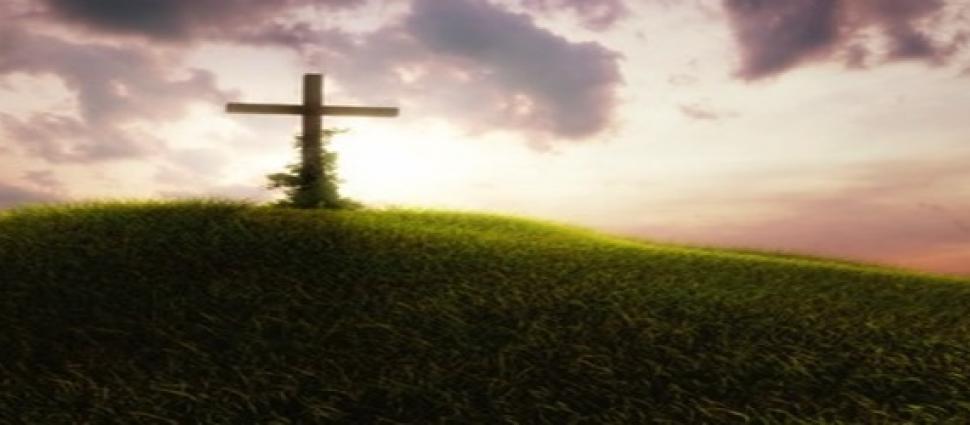Hyssop – A Passion Meditation

Hyssop isn’t much of a shrub. It grows clinging to walls and rocks around the Mediterranean. It is however important for its cleansing properties, physical and ritualistic.
Under the old covenant, there were priests and sacrifices. But there was no great High Priest and there was no final sacrifice for sin. So sacrifices were continually offered. They went on every year. Their very repetition underscored that they were incomplete. They perfected no one. They could not sanctify – set people apart and begin to transform them so that sin had less and less of a grip. They were temporary. They were never meant to be permanent (Hebrews 10:1, 3).
Now we ask the question: Does that mean that believers under the old covenant did not find joy and rest in forgiveness? Yes, they did – in a measure. The sacrifices pointed them to something better that was to come. They pointed them to this better thing that could deal with the sin problem.
David was sinful like the rest of us, a sinfulness covered by the sacrificial system. But King David was guilty of two other things - adultery and murder. Those two sins, under the old covenant, had no sacrifice for guilt, no path to forgiveness. David knew that. He had to live with the effects on his family, and publicly throughout his reign. Those sins carried a whole burden of terribly negative consequences which he just had to live with (Numbers 5:16-21, 30-31; Leviticus 20:10).
Psalm 51 is his prayer. His concern is not with his circumstances. It's about his relationship with God. He comes to talk frankly to God, saying, “I need to be cleansed. I need your cleansing.” But there is no sacrifice that provides cleansing for those who commit these sins. So he says, “Purge me with hyssop, and I shall be clean; wash me, and I shall be whiter than snow” (v.7).
What is David talking about? What does he have in mind?
He used a word which takes us back to the Exodus. Remember, God had decreed that the angel of death was coming and that the firstborn in every home in Egypt would die. That was true whether it was Israelite or Egyptian –the firstborn dies. But then God made provision. God said, “Take a lamb and kill it. Take hyssop and dip the hyssop in the blood of the lamb. Dab it on the doorposts and lintel of your house. Then when the angel of death comes, he will ‘pass over’ you. (Exodus 12:21-23)
David uses the image of hyssop from Passover. He says to God, “I know that the Law does not have any sacrifice to deal with my particular sins, but there is a sacrifice that You know of, something You have in mind. I pray that You would dip hyssop into the blood of the Lamb who can cleanse me from these sins of adultery and murder. Reconcile me to Yourself!”
David, as an Old Testament believer, sees in the sacrificial system something that points to something more profound, that goes far deeper. “Purge me with hyssop, and I shall be clean; wash me, and I shall be whiter than snow.”
Looking forward, a thousand years after David, we see the sacrifice of Christ. He hangs on the cross as the promised means by which we can be reconciled to God. As He hangs there, Gentiles – Roman soldiers who know nothing of the Bible – dip hyssop in sour wine, wine the symbol of blood. They reach it up to the lips of Jesus on the cross, as if pointing to Him. In one biblical gesture, the hyssop says, “David, here He is! Here is the Sacrifice that can deal with your sin. Here is “the Lamb of God, who takes away the sin of the world” (John 19:29, John 1:29).
The sacrifices of the old covenant were temporary. Here was the One who is permanent. Here is the One who cleanses the conscience of sin. Here is the Sacrifice who, first, cleanses those who draw near to God, and then sanctifies those who come to God in this way (Hebrews 10:2, 14, 22).
First, the guilt of sin, that awful sense in my heart that I've fallen short of God's glory, is gone. My realization that an enormous barrier stands between me and God vanishes. The sacrificial death of Jesus removes that. He removes the condemnation. He draws me into a relationship with God previously unimaginable.
Then going beyond the guilt, He deals with the filth of sin in my heart. A transformational cleansing goes to the very heart of my nature. The blood of Jesus not only reconciles me to God, it continues to cleanse me from all unrighteousness (1 John 1:9).
Through His death, all the agitation, all the judgment, all the condemnation of my conscience is washed away, because I am leaning into Christ. I am resting on Christ. I am trusting in the completeness of what He accomplished by His death on the cross.
In the Lord’s Prayer, we ask for daily bread and for daily pardon. “Forgive us our trespasses…” we pray (Matthew 6:11-12).
And God says, “Behold, the Lamb of God, who takes away the sin of the world!”
Liam Goligher, Senior Minister of Tenth Presbyterian Church in Philadelphia and speaker on No Falling Word. His messages on the Doctrine of the Trinity are also available in two sets as CDs, MP3s or downloads on the Trinity page.





